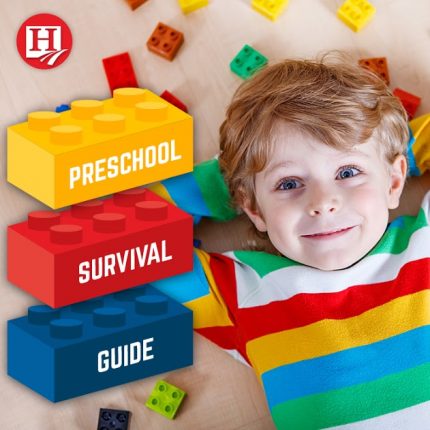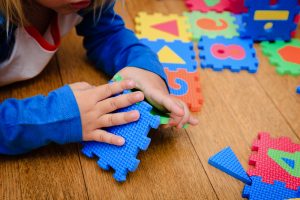
Preschool Mom’s Survival Guide
August 10, 2018Are you ready to pull your hair out? Feeling like you can’t turn your back for a minute or the house will crumble? If so, you might be the parent of a preschooler! Preschoolers definitely keep us on our toes! The emotional, physical, and social development of young children has a direct effect on the adults they become, according to the Encyclopedia on Early Childhood Development. But what about preschool? Can you teach your preschooler at home? The answer is a resounding YES, and this preschool survival guide will touch on the key points to help you do so!
Benefits of Early Childhood Education
There’s no doubt about it – preschool-aged children need educational stimuli. Time and again, studies have shown a  growing disparity between those of low-income families and those from middle-income households, much of which is attributed to a lack of education.
growing disparity between those of low-income families and those from middle-income households, much of which is attributed to a lack of education.
Children need opportunities to develop cognitively, emotionally, socially, and physically. By preschool-age, children are ready to build more complex skills, such as learning letters and numbers. A popular study known as the HighScope Perry Preschool Study Through Age 40 followed 123 individuals from age 3 to age 40. Interestingly, of those who attended preschool programs, 80% graduated high school compared to 60% of those who did not attend a preschool program. But, how can you provide the same experiences at home?
How to Homeschool a Preschooler
First, rest assured that YOU are more than capable of providing your preschooler with an enriching experience at home! That said, one of the best things you can do for your preschooler (and, in turn, your own sanity) is to create a relaxing atmosphere. Try not to get too caught up in “academics” at this age. Let life be learning and keep learning enjoyable. Here are some pinpoints – perfect for “list makers” – to help guide your teaching:
- Academic: Start by making a list of preschool guidelines and goals for your little one. For instance, you may decide that by kindergarten you would like for your child to be able to read simple high-frequency words. Working backward, then, you’d definitely want to spend the preschool years covering letters and their sounds. If your child seems to fly through this, feel free to start teaching blends such as “ba, be, bi, bo, and bu” or “da, de, di, do, and du.” Once your child has mastered blends, begin teaching ending sounds and show your child how words are formed! As an example, “du” + “ck” = “duck.”
As for math skills, you can start by teaching your child to count out loud. There is a big difference between counting and number identification, so be sure to teach both. From there, you can teach how numbers are “formed” (3 apples plus 2 apples makes 5 apples, etc.). Don’t forget to include some cool math games to round out their studies!
 The other areas (science and history) can totally wait until kindergarten. Nothing formal is required in the preschool ages, but many parents like teaching simple science such as life cycles – particularly the life cycle of a pumpkin or butterfly – and basic experiments. Other simple science ideas include pizza activities, homemade playdough, and color mixing!
The other areas (science and history) can totally wait until kindergarten. Nothing formal is required in the preschool ages, but many parents like teaching simple science such as life cycles – particularly the life cycle of a pumpkin or butterfly – and basic experiments. Other simple science ideas include pizza activities, homemade playdough, and color mixing!
If you feel your little one would benefit from a more structured program, consider a preschool curriculum such as Time4Learning! In it, you’ll find skill-building activities with an emphasis on play-based learning, primary games, and experiential learning. - Character Development: Preschoolers are very social beings! What better people to teach them social skills than their parents. While they definitely benefit from interactions with others their own age, they’ll most likely learn more about positive behaviors from others older than them. One benefit to homeschooling is that children aren’t only around children their own age and they learn to interact with people of all ages.
For Christians, the preschool years are also a great time to teach children about God’s love for them. In addition, children in this age group can learn to share, how to obey, how to have good manners, and how to listen. - Chores: Teaching responsibility should definitely start young. Preschoolers can usually handle basic tasks like putting away toys, picking up shoes, and even folding washcloths. It’s also helpful to purchase child-sized cleaning supplies so your preschooler can help you do the household chores. As with everything else, keep it relaxed (and even playful) and watch your little one transition right into the things you’re teaching him or her!
Parenting doesn’t come with a guidebook, but a concise preschool how to guide can smooth out some of the bumps in the road. Providing your preschooler with an educational experience at home takes a little planning and forethought, but it’s doable and, in most cases, preferable.
Latest Posts

Guest Post by Gabriel Morse For several years, I sat for long hours every day behind one of those battleship gray desks in a windowless, dull, gray office. The pay was enough to take care…
Read more >
This post is sponsored by Little Monsters Universe. I'm Tina Salmanowitz, an advocate for homeschooling and science education. With over a decade of experience as a science educator (in class…
Read more >
This post is sponsored by Time4Learning. Before the pandemic, it was business as usual for Boca Raton resident Nikki Warris. Her two daughters, 5-year-old Natalie and 8-year-old Lexi were…
Read more >

